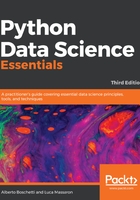
Alternatives to Jupyter
If you don't like using Jupyter, there are actually a few alternatives that can help you test the code you will find in this book. If you have experience with R, the RStudio (http://www.rstudio.com/) layout may appeal more to you. In this case, Yhat, a company providing data science solutions for decision APIs, offers their data science IDE for Python free of charge, named Rodeo (http://www.yhat.com/products/rodeo). Rodeo works by using the IPython kernel of Jupyter under the hood, yet it is an interesting alternative given its different user interface.
The main advantages of using Rodeo are as follows:
- A video layout arranged in four Windows: editor, console, plots, and environment
- Autocomplete for the editor and console
- Plots are always visible inside the application in a specific Window
- You can easily inspect the working variables in the environment Window
Rodeo can be simply installed using the installer. You can download it from its website, or you can simply use the following in the command line:
$> pip install rodeo
After the installation, you can immediately run the Rodeo IDE with the following command:
$> rodeo .
Instead, if you have experience with MATLAB from Mathworks, you will find it easier to work with Spyder (http://pythonhosted.org/spyder/), a scientific IDE that can be found in major Scientific Python distributions (it is present in Anaconda, WinPython, and Python (x, y)—all distributions that we have suggested in this book). If you don't use a distribution, in order to install Spyder, you have to follow the instructions that can be found at http://pythonhosted.org/spyder/installation.html. Spyder allows for advanced editing, interactive editing, debugging, and introspection features, and your scripts can be run in a Jupyter console or in a shell-like environment.